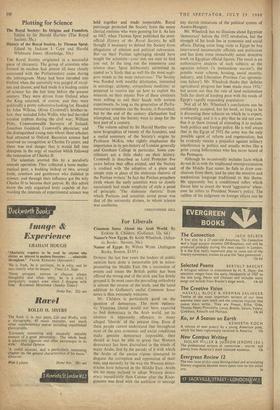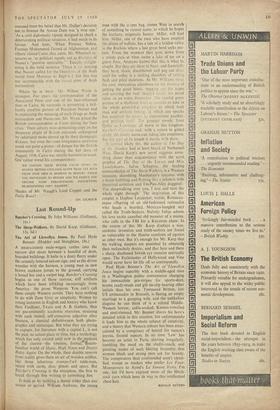For Liberals
Common Sense About the Arab World. By
tic Books : Stevens, 30s.)
DURING the last few years the leaders of public opinion have done a memorable job in misre- presenting the Middle East. On a succession of events and issues the British public has been offered the wrong end of the stick and has firmly grasped it. In most cases the prevailing orthodoxy is almost the reverse of the truth, and the latest addition to Gollancz's useful Cotnmon Sense series is thus extremely welcome.
Mr. Childers is particularly good on the question of democracy. The most optimis- tic Victorian liberal would not have expected to find democracy in the Arab world, yet its absence is apparently offensive to many alleged 'liberals' of the present time. Even if these people cannot understand that throughout most of the area economic and social conditions make genuine democracy impossible, they should at least be able to grasp that Western democracy has been discredited in the minds of many Arabs, first by the parody of it with which the Arabs of the ancien regime attempted to disguise the corruption and oppression of their rule, and secondly by the way the Western demo- cracies have behaved in the Middle East. Arabs are no more inclined to adopt Western demo- cracy immediately than Cavour after the Risor- gimento was fired with the ambition to attempt any slavish imitations of the political system of Austro-Hungary.
Mr. Wheelock has no illusions about Egyptian 'democracy' before the 1952 revolution, but the strength of his book lies in economic and social affairs. During some long visits to Egypt he has interviewed innumerable officials and politicians and has done some remarkably astute detective work on Egyptian official figures. The result is an authoritative analysis of such subjects as the agrarian reform ('a tremendous success'), the potable water scheme, housing, social security, industry, and Liberation Province ('an ignomin- ious failure'). Mr. Wheelock thinks that 'definite agricultural progress has been made since 1952,' but points out that the rate of land reclamation 'falls far short of keeping pace with the needs of Egypt's rapidly expanding population.'
Not all of Mr. Wheelock's conclusions can be confidently accepted, but his book, so long as he is discussing these subjects on which he is expert, is rewarding; and it is a pity that he did not con- fine it to them instead of extending it to include both politics and foreign policy. He is well aware that in the Egypt of 1952 the army was the only possible agent of reform and regeneration, but he evidently retains a prejudice against military interference in politics and usually writes like a prim young Jeffersonian who has never heard of the Pentagon.
Although he occasionally includes facts which do not fit in with the traditional misrepresentation of the Middle East scene, he fails to draw con- clusions from them, and he uses the emotive and tendentious language traditional to this theme. He apparently has a conditioned reflex which forces him to insert the word 'aggressive' when- ever he refers to President Nasser's policy. The calibre of his judgment on foreign affairs can be assessed from his belief that Mr. Dulles's decision not to finance the Aswan Dam was 'a wise one.' 'As a cold diplomatic riposte designed to check a deteriorating political situation, it had much in its favour: And later, 'When Premier Nehru. Premier Mohammed Daoud of Afghanistan. and others' visited Cairo, they came, Mr. Wheelock re- assures us, 'as political equals, not as disciples of Nasser's "positive neutrality." ' Equally enlight- ening is the bold sentence 'There is no denying that Nasser called for the liberation of the Arab world from Morocco to Baghda :1, but this was not incompatible with the broad aims of Arab nationalism.'
Where he is weak Mr. Wilton Wynn is strongest. For year; the correspondent of the Associated Press and one of the best-informed men in Cairo. he succeeds in presenting a bril- liantly credible picture of President Nasser and in explaining the meaning of such things as Arab nationalism and Nassei ism. Mr Wynn pitied the British correspondents in Cairo during the Suez crisis 'Their editors were demanding copy on the desperate plight of B:itish nationals endangered by infuriated mobs stirred up by their demagogic dictator, but even the most imaginative newsmen could not paint a pictur.:. of danger for the British community in Cairo during the hot days of August, 1956. Cairo was strictly business■as usual. One editor wired his correspondent:
WE CERTAIN THERE tiErrER COLOR STORY ON STATUS BRITISH CIVILIANS EGYPT THAN YET BEEN FILED STOP THIS IS MOMENT IN HISTORY WHICH YOU PRIVILEGED TO REPORT AND WE EXPECT YOU UPCOME WITH PHRASEMAKING PACESETTING HEARTRENDING COPY SOONEST.'
Shades of Mr. Waugh's Lord Copper and the
Daily Beast! IAN GILMOUR



































 Previous page
Previous page